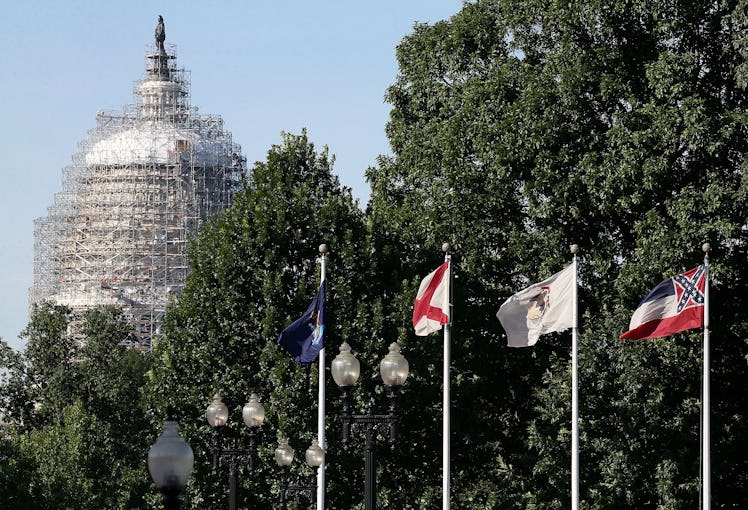
This State's New Abortion Bill Is So Restrictive It Might As Well Be A Ban
The latest news when it comes to abortion access is not reassuring. On Thursday, March 21, Mississippi Gov. Phil Bryant signed a bill that bans abortions in the state once the fetus's heartbeat can be heard. The bill, which is poised to be one of the strictest abortion bans in the country, could ban abortion as early as six weeks into a pregnancy, around the time early traces of fetal heartbeat can be perceived. Elite Daily reached out to Bryant's office for comment on the bill and his remarks, but did not immediately hear back. Mississippi's new abortion law is wildly restrictive, and reproductive rights activists and organizations are preparing to fight back.
Mississippi's abortion bill, SB 2116, which is slated to take effect on July 1, 2019, not only prohibits abortions of "an unborn human individual with detectable fetal heartbeat," but it also penalizes physicians who perform the abortions. The bill states:
A physician performing an abortion on a pregnant woman after determining that the unborn human individual has a detectable fetal heartbeat is subject to license revocation or disciplinary action.
At the signing ceremony, Bryant celebrated the bill, calling a heartbeat “the universal hallmark of life since man’s very beginning.” Elite Daily reached out to Bryant's office for comment on the bill and his remarks, but did not immediately hear back.
For further insight on the bill's impact, Elite Daily reached out to Dr. Natalie Hinchcliffe, a family medicine provider in Ohio and Fellow with Physicians for Reproductive Health. Dr. Hinchcliffe tells Elite Daily that Bryant's definition of a heartbeat is not a medical definition, but the governor's personal one. Hinchcliffe added, "The attempt to politically define when life begins is a direct attempt to control women and pregnant peoples’ bodies by applying the personal beliefs of some politicians onto everyone." Elite Daily reached out to Gov. Bryant's office for comment on Dr. Hinchcliffe's statement, but did not hear back at the time of publication.
Mississippi, which only has one clinic offering abortion services in the entire state, will join a list of states like Louisiana, Indiana, Missouri, and Texas, that have recently introduced or passed extremely restrictive abortion bills, including six-week bills in states like Iowa, which a state judge declared unconstitutional.
The Center for Reproductive Rights released a statement on Tuesday, March 19 vowing to sue to block the new bill. In the statement, CRR notes the bill "would ban abortion before many women know they're pregnant," which CCR calls "blatantly unconstitutional." Elite Daily reached out to Gov. Bryant's office for comment on CRR calling the bill "unconstitutional," but did not hear back at the time of publication. After the Supreme Court case Roe v. Wade affirmed the right to an abortion nationally in 1973, the Supreme Court's 1992 decision in Planned Parenthood v. Casey further upheld the right for pregnant people to decide to have an abortion before the fetus is viable, usually around 24 weeks. The case also affirmed that while states could regulate the procedure, they could not put an "undue burden" on individuals attempting to access abortion — leaving the debate about what kinds of burdens are "undue" ongoing.
Dr. Hinchcliffe says that Mississippi's strict abortion timeline constitutes an "undue burden" because it bans abortion before most people know they are pregnant. "This is beyond an undue burden. This is an impossible burden." Elite Daily reached out to Gov. Bryant's office for comment on Dr. Hinchcliffe asserting the bill is an "undue burden," but did not hear back at the time of publication.
Dr. Daniel Grossman, an abortion provider and director of Advancing New Standards in Reproductive Health (ANSIRH), explains the implications of the bill:
A heartbeat is not usually detectable before [six] weeks of pregnancy, which is about [two] weeks after a missed period. So that means a patient would have [two] weeks to recognize they’re pregnant, finalize their decision, find a facility with an available appointment, get time off work or from school, get the needed money together, and arrange transportation.
Dr. Grossman adds, "This burden is so extreme that it essentially makes abortion impossible to access for the vast majority of patients." Elite Daily reached out to Gov. Bryant's office for comment on Dr. Grossman's statement, but did not hear back at the time of publication.
Reproductive rights advocates are already pushing back against the bill. In an email to Elite Daily, Deputy National Communications Director at NARAL Pro-Choice America calls the law "unconstitutional," saying:
It would make it harder for healthcare providers to operate in Mississippi — a state already facing a crisis when it comes to medical care for women and families — by penalizing doctors who perform abortion services and creating a nightmare scenario as medical professionals flee the state and clinics are forced to close that are the primary source of heath care for many women. Further, this bill would make no exception for women who are survivors of rape or incest, meaning survivors would be forced to carry their pregnancy to term.
Elite Daily reached out to Gov. Bryant's office for comment on NARAL Pro-Choice America's statement on the bill, but did not hear back at the time of publication.
On its website, NARAL Pro-Choice America notes that "91 percent of Mississippi women live in counties with no abortion clinic," calling abortion policies in the state "severely restrictive."
Dr. Hinchcliffe notes that this law, like all abortion care restrictions, will disproportionately impact people of low income, people of color, and LGBTQIA people, adding, "Abortion is health care. Doctors know this; patients know this; it’s time for politicians to understand this."
Though the heartbeat bill has been signed by the Republican governor, the state can expect legal action from CCR that may block the law or strike it down.